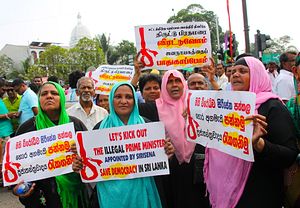During former President Mahinda Rajapaksa’s 10-year rule in Sri Lanka, democracy was cosmetic, a veneer intended to make authoritarianism more palatable. Rajapaksa dismantled constitutional provisions that were meant to check his power. He allowed the military to commit rampant human rights violations with impunity. Freedom of speech was virtually nonexistent. Those trends reversed in January 2015 when current President Maithripala Sirisena pulled of a shocking victory at the polls, defeating Rajapaksa amidst election violence and tampering.
Although Sirisena’s commitment to democratic reform has progressively waned since his election — as has his popularity — nobody expected him to suddenly and illegally restore Rajapaksa to power. But that’s exactly what Sirisena did last month, when he fired his prime minister, Ranil Wickremesinghe, and appointed Rajapaksa as his replacement.
Though Sirisena’s decision seems to have been primarily motivated by his animosity towards Wickremesinghe, his decision nevertheless threatened to return Sri Lanka to authoritarian rule. Within 24 hours of Rajapaksa’s purported appointment, mobs of Rajapaksa supporters immediately seized control of government ministries and state media. Pictures of Rajapaksa meeting with military leaders and police flooded into the public sphere.
Despite Rajapaksa’s autocratic tendencies, a significant portion of the population initially celebrated. Rajapaksa had always retained popularity among the majority Sinhala Buddhists, many of whom subscribe to his ethno-nationalist populism and regard him as a hero for ending Sri Lanka’s civil war.
It appeared, initially, that Rajapaksa and Sirisena had pulled off a masterfully orchestrated coup d’état.
Yet a month later, Rajapaksa’s grip on power is as tenuous as ever. His support base has dwindled and his claims to legitimacy have become farcical. He is no longer neither feared nor loved; instead he’s mostly laughed at.
The Rise of Resistance
Wickremesinghe and his political party, the United National Party (UNP), immediately objected to Rajapaksa’s purported appointment. Wickremesinghe maintained that he was still the legal holder of the Premiership and that he would remain in Temple Trees, the official prime minister residence, unless he was legally deposed via a no confidence motion in Parliament.
Rajapaksa’s political allies responded by publicly threatening to storm Temple Trees, while the police removed most of Wickremesinghe’s security detail. Despite their inability to access armed protection, the UNP managed to retain control of Temple Trees by organizing hundreds of party supporters, including Buddhist monks, to camp out in and around the residence to deter attacks.
With Rajapaksa taking over the prime minister’s office and mainstream media, Temple Trees has become a critical visible symbol that the legitimate government had not yet been defeated.
Meanwhile, tens of thousands turned out on the streets to protest the coup, both in large political rallies organized by the UNP, and significantly, protests organized by civil society daily in Colombo and also across the country.
The Decline of Rajapaksa
At first, Rajapaksa was able to counter the signs of mass resistance. Thousands turned out for a pro-Rajapaksa rally in Colombo. But those dynamics began shifting on November 3rd when Member of Parliament Range Bangara released an audio recording of a call that substantiated rumors that Rajapaksa’s allies were offering bribes of up to $2.8 million in exchange for political support.
When the call went viral on social media, the political tide began turning against Rajapaksa, according to Sanjana Hattotuwa, a senior researcher at the Centre for Policy Alternatives (CPA), a local think tank.
“The scrutiny of the bribes was a severe embarrassment. Nobody could have taken the money after that and survived politically,” he said.
Six days later, when it became clear that Rajapaksa would be unable to secure support from a majority of Parliamentarians, Sirisena illegally dissolved Parliament.
But that too failed when CPA, an election commissioner and several political parties simultaneously filed 10 Supreme Court petitions challenged the president’s action. The Supreme Court responded by suspending the dissolution of Parliament.
Upon reconvening for the first time since the beginning of the crisis, Parliament immediately passed two No Confidence Motions against Rajapaksa on November 14th and 16th, despite unprecedented violence on the Parliamentary floor. In two consecutive Parliamentary sessions, MPs aligned with Rajapaksa attempted to attack Speaker Karu Jayasuriya to prevent him from holding votes.
Images of MPs hurling chairs and chili powder at Jayasuriya and the 30 unarmed policemen protecting him went viral on social media. According to Nalini Ratnarajah, a human rights activist who is involved with organizing protests in Colombo, “even people who previously supported Mahinda were disgusted by the violence in Parliament. Now they are turning out to protest every day.”
The shift in attitude towards Rajapaksa is apparent on social media, where Rajapaksa’s posts are responded to with barrages of taunts.
“Almost overnight people stopped buying what they were selling,” said Hattotuwa, referencing his research on social media engagement during the coup. “There is nothing that the Rajapaksas can put out that people aren’t laughing at.”
As critics of Rajapaksa’s family were frequently abducted in white vans during his presidency, such a response is both extraordinary and unprecedented.
Despite the backlash, Rajapaksa has refused to step aside. On December 3, Rajapaksa took another major hit when a court issued an interim order preventing him from functioning as prime minister. With the court scheduled to take the case up against on December 12, a final verdict and potentially an end to the crisis are in sight.
Rajapaksa initially erred in overestimating his ability to procure political support. But much more damaging are increasingly drastic tactics that he has employed to compensate. Each step of the way, the resistance movement expanded, strengthened and grew more confident.
Lisa Fuller is a Sri Lanka-based freelance journalist. She previously worked as a senior staff member for Nonviolent Peaceforce.

































